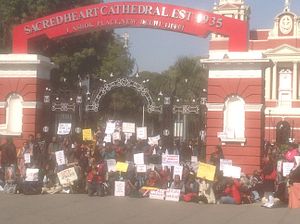Police arrested hundreds of protesters demonstrating against a spate of recent religious attacks on Christian sites in New Delhi on Thursday, forcing the assembled priests and nuns onto buses and sending them to local station houses.Word of the arrests spread rapidly and scores of people descended on the venue to continue the demonstration.
The demonstration centered around Prime Minister Narendra Modi’s silence over the recent spate of attacks on churches in the capital. Protesters were chanting and waving placards that read “Stop the Attack on Churches” and “Don’t Attack Secular Values” outside of the Sacred Heart Cathedral when they were surprised by police, who conducted arrests without warning. Some nuns were gasping for breath, others lay dazed on the ground as they were taken from the protest venue and loaded into police buses. Law enforcement officials said the demonstration was “unlawful.”
The protests came after a Catholic church was vandalized in a residential area of South Delhi on Monday. There have been no injuries in any of the five attacks that have occurred at Christian sites in the capital since December, but the frequency of those acts of vandalism has raised fears that the disturbances could be connected to a larger plot against religious groups.
Demonstrators like Father Varghese Matamana decried Modi’s “administrative callousness” in handling the attacks. “We have never faced this kind of a situation in the national capital.” Matamana said. “Why are these vandalizations taking place only in the last few months? Christians are worried… our worry is compounded by the complete silence of the PM.”
Rita S. Aggarwal, a protestor who was manhandled by police, was more blunt in her criticism of Modi. “As a Christian in India, I am worried.” Aggarwal said. “Our only fault is that we are minority. This is a country for all, we are a secular nation and this government is forgetting to fulfill its constitutional and moral obligations.”
Aggrawal was once optimistic that Modi’s election would be good for India’s Christians. “We had lots of hope from Modi and we trusted his dictum that everybody would be an equal partner in India’s growth. But he has belied our hope. His ascension has unleashed radical Hindu fundamentalist forces who are very brazen in their attempt to homogenize this multi-religious and multi-ethnic nation.”
Similar criticisms are taking root in the U.S. House of Representatives, where Republican lawmaker Joe Pitts recently cited the figure of 38 attacks that allegedly had taken place against Christian minorities in the last few months of 2014 in India. “India’s historic pluralism is being replaced with intolerance, division, and majoritarianism,” Pitts said.
Pitts’ reaction has been reinforced by recent religious conversions conducted by Hindu fundamentalists, communal riots, and blatant efforts to doctor India’s historical record and school textbooks.
Before Narendra Modi became prime minister, there was widespread fear among liberals that his arrival in Delhi would lead to religious polarization and bring Hindu radical groups into the political mainstream. The Bharatiya Janata Party (BJP) leader’s message of economic development discounted those fears.
After eight months, Modi’s critics appear to be winning the argument. Religious tension has become a distinct part of India’s social fabric since Modi assumed power. Delhi, which had never experienced any clashes between Hindu and Muslim groups over the last 30 years, witnessed two incidents of violence between the communities in Trilokpuri and Govindpuri. The “love jihad” launched by Hindu outfits late last year also caused tension in Uttar Pradesh, India’s most populous state, highly vulnerable to religious riots.
Critics now question the BJP’s sincerity in adhering to India’s secular character. Doubt cropped up recently when a government advertisement, released in print on the eve of the Republic Day, omitted the words “socialist and secular” from an image of the preamble of India’s constitution. The outcry from the incident forced Modi to restate the government’s commitment to secularism.
U.S. President Barack Obama, chief guest at India’s Republic Day parade, also spoke in Delhi during his visit about the need to maintain religious harmony in India. “Every person has the right to practice their faith how they choose, or to practice no faith at all, and to do so free of persecution and fear of discrimination.” Obama said in his last public appearance in Delhi of the trip. “Nowhere is that more important than India, nowhere is it going to be more necessary for that foundational value to be upheld. India will succeed so long as it is not splintered along lines of religious faith, along lines of anything, and is unified as one nation.”
Thursday’s protest reinforces the message that Barack Obama brought to India. India cannot prosper if its diversity is threatened. For respect for diversity is a recipe for development.




































